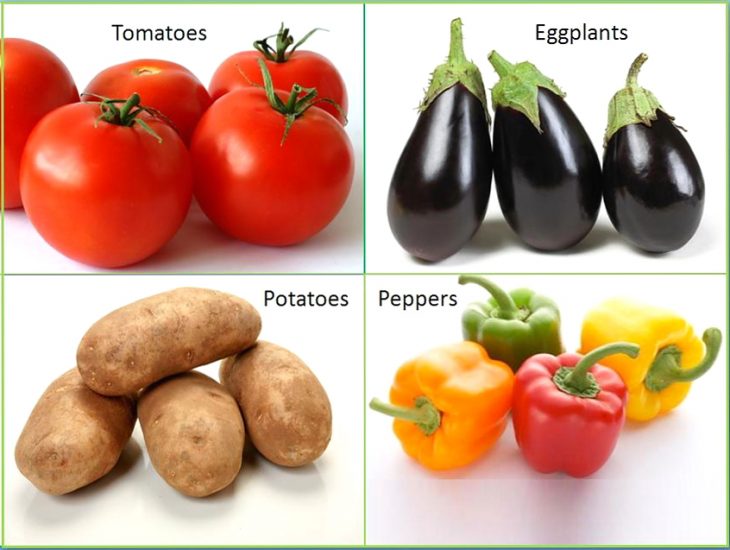



Members of the family Solanaceae, common nightshades include potatoes (not including sweet potatoes), tomatoes, aubergine and peppers (including chilli peppers and sweet peppers!) Do you suffer from gluten or dairy intolerance, mood swings, indigestion, rheumatoid arthritis, psoriasis or another skin condition? If so, the hidden culprit could be nightshades. Other symptoms of nightshade intolerance are depression, anxiety, constipation, fibromyalgia, osteoporosis, joint pain, headaches, nausea, bloating, flatulence, IBS, & anaemia. Symptoms of nightshade intolerance often also overlap with those of gluten or dairy intolerance!
Author of “The Paleo Diet”, Professor Loren Cordain, says that the anti-nutrients in nightshades can interfere with human digestion causing our intestine walls to become permeable (develop microscopic holes in the lining or walls). This is also known as “leaky gut”. This becomes an open invitation to many of our modern auto-immune diseases. When somebody develops ‘leaky gut’, various proteins that should stay inside the digestive tract make their way out into the bloodstream, and the body attacks them in response, thinking they are essentially ‘intruders!’
Both of these chemicals play a major role in increasing intestinal permeability, laying the groundwork for a variety of modern autoimmune conditions.
Saponins are natural chemicals in some plants that can impair health by creating holes in the intestinal lining. A perforated intestine is vulnerable to any microbes and toxins that may enter the bloodstream. Foods high in saponins are potato skins and chips or wedges with the skins left on. Potatoes which appear ‘green’ have a particularly high level of saponins. Green tomatoes and tomatoes that are harvested before they are ripe, are exceedingly high in these toxins, whereas ripe tomatoes have low levels. Peppers are also high in saponins, such as Bell peppers, Cayenne pepper, Chilli pepper, Paprika, Jalapeno pepper, Habanero, and Tabasco.
Lectins are natural proteins in plants that are ‘cell code breakers’. Our cell walls are covered with chemical receptors to protect and ensure entry of only the right compounds. Lectins can crack the codes and trick the cell into doing things it normally would not do. Lectins can bypass our defences, ‘getting behind the lines’ to travel all over the body. Lectins can penetrate the protective mucus of the small intestine, promoting cell division at the wrong time, and even causing cell death. Lectins can perforate the intestinal wall, or trick the immune system to thinking there’s an intruder, causing an allergic reaction.
Lectins and Saponins act like a Trojan Horse intruder into the intestines, exposing the body to microbes and toxins that would normally be immediately destroyed by a healthy immune system.
If you are sensitive to nightshades, your body reacts to Saponins and Lectins in the vegetables and begins developing antibodies to fight off the allergen. The presence of these antibodies causes other chemical reactions that lead to inflammation and irritation in soft tissue. Histamine is one chemical that soft tissues produce to help protect the body from harmful substances. Histamine causes inflammation and irritation when it is released throughout the body. This can take the form of joint pain or stiffness in the body.
Skin reactions can also accompany nightshade vegetable allergy. Contact dermatitis is general inflammation and itching due to contact with nightshade vegetables. Skin can become blotchy, inflamed and irritated in response to increased histamine in the skin. Hives may form in various shapes and sizes. This type of skin rash can appear, disappear and reappear for no apparent reason. Psoriasis can also appear to worsen if you are sensitive or intolerant to nightshades.
A simple elimination diet. This is probably the best place to start if you suspect you may be sensitive to nightshades. In this type of diet, you simply avoid one or more foods that you consider to be the cause of your problem. Typically, people have more than one allergy, intolerance, or sensitivity, so trying one food at a time may not suffice- cut out all nightshades and keep a daily log of your symptoms to note any improvements
Book a food sensitivity test. Through kinesiology and muscle testing, we can establish whether the nightshades are affecting your condition and potentially exacerbating it.
Take a high strain probiotic. Between 60-80% of our immune system is located in the gut. More than 40 illnesses have been lined to bacteria imbalance including arthritis, depression, IBS and Cancer! The bacteria in our gut also create more than 95% of our serotonin (feel good hormone) in our bodies. To ensure your gut bacteria are balanced and your immune system is supported, we recommend a good probiotic or microbiotic, such as BioKult or Optibac.
Whether you are currently suffering with any of the symptoms listed above, or would like a free phone consultation on how kinesiology can improve your health, drop us a message or an email to: Maeve@midlandskinesiology.com